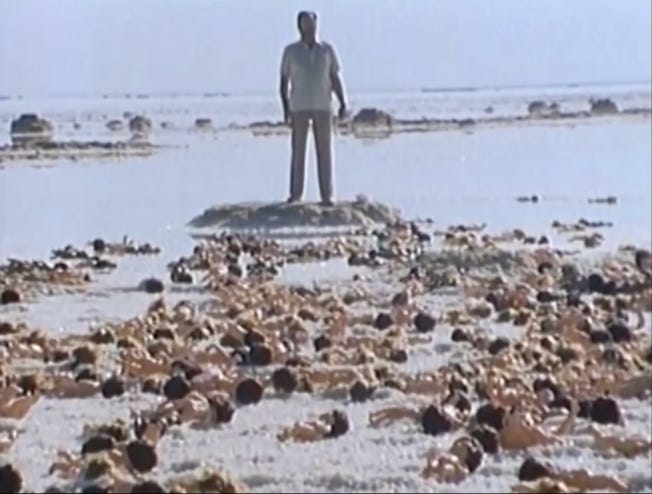How To Find Stories
A post about one of the most miserable / incredibly exciting parts of the process
Hello! I thought I’d make this post free, but this is what paid subscribers are getting once or twice a week. Basically, this Substack is where I’ll be detailing every technique I’ve picked up about making this kind of writing - long-form narrative nonfiction – work.
I was remembering the other day how some people who watched Avatar reported feeling depressed afterwards because real life could never match up to that beautiful dream. (Personally I think if they’d gone to see the Blue Man Group do a show in a forest they’d have been fine.) I bring it up because that’s how I want to feel when I’m working on a big story - so immersed it feels like a dream.
Last week I posted about how you might find your theme – some hazy world you’d like to begin to explore. If you read it I assume you now have a theme because it was perfect. This post is about one way to find stories within that theme.
I’m deep into a new book and it’s reminding me that with this kind of writing, stories are everything. I have no interest in writing about, say, research conducted in labs by social scientists. I think it’s fine to have a bit of that if you think it’s important or surprising, but I keep it to a minimum. This is partly because – and sorry to be haughty – most nonfiction books are filled with research from social scientists, and we want to be better and more original than that. This kind of writing should feel like a movie or a novel, with scenes, characters, adventures, movement – showing not telling.
I’m always trying to either find myself in the midst of some wild unfolding story, or else sitting with someone as they tell me their story – hopefully an incredible story they’ve never told anyone before. I used to think that first-person adventuring was better journalism than teasing out a person’s anecdote, but now I think both can be equally gripping, and I have no preference.
But how to find these stories?
The best way – I apologize to introverts - is to talk to people within the world you want to explore. That’ll be a subject for a later post. But there’s a second-best way. Which is to read a hell of a lot of boring academic papers and listen to often very boring nonfiction audiobooks and podcasts. There’ll be a lot of dead ends. You’ll feel despondent. I can feel incredibly bleak during this part of the process. If I’m sitting on a bench listening to an audiobook for work and I can’t find anything interesting, sometimes I’ll suddenly think with horror, “I’m just a man sitting on a bench.”
But you know what? That kind of failure is fine. When you’re having terrible days or weeks, endless hours when you aren’t finding anything, try to remember that identifying and rejecting shitty ideas is part of the journey towards finding great ideas.
Because buried away in some of these boring books and papers are, when you least expect it, gems.
And by gems I do NOT mean the author’s ideas or theories. Those are the last things we want. We want to form our own ideas. By gems I mean a little glimpse of something surprising and dissonant and mysterious – a person or a situation or a moment in history where you think, ‘I didn’t expect that’ or ‘I don’t understand that, I’d like to go down a rabbit hole about that.’ It could be the tiniest thing. But if your mind is tuned right, you might spot it.
I’ll give you a couple of examples from Seasons 1 and 2 of my BBC show Things Fell Apart. I mentioned in an earlier post that my idea for that show emerged from an unpleasant twist in my personal life. During lockdown I was watching friends lose their minds on social media. They were hardening, radicalizing, growing furious, developing strange and irrational ideas, falling so far down rabbit holes they could no longer see the sky. I had some very painful altercations with one or two of them, but mostly I was wondering from afar, why is this happening to them? What are the mechanics behind them falling apart so intensely?
It’s good to have a personal connection to whatever story you’re doing – having skin in the game puts wind behind your sails. (In a later post I’ll detail why it turns out to not be a good idea to have two metaphors in one sentence.)
When the BBC asked me if I wanted to make a series about the culture wars, my first thought was maybe I could try and solve that mystery. But how to make a series about the culture wars that didn’t become a culture war? I didn’t want to pour gasoline on any fires. I don’t enjoy scrapping with people. So I figured the best way would be to go back in time and find the origin moments, the pebbles thrown in the pond.
I’ve told other ripple effect narratives – my podcast The Butterfly Effect was all about the ways our actions ripple out over time and space, impacting other people, and I’ve always enjoyed that structure. So I started reading academic papers and books about the history of the culture wars. Most of the people featured in them were exactly who you’d expect – politicians or rightwing preachers or civil rights leaders or experts.
I try especially to avoid interviewing experts. As I mentioned in a post last week, it’s not because I’m personally anti-them. I like them! What I’m anti is the way including experts can screw up the tone of your story. There are a whole bunch of shows out there about the culture wars that heavily feature experts. But if you institute a ‘no expert’ policy, it means you HAVE to only interview people with some first-person connection to the story – people whose lives spiraled and became origin stories for world-shattering culture wars.
This turned out to be a fantastic rule for Things Fell Apart. It defined the show. Human stories offer so much light and clarity, especially when you find them in the midst of deafening wars.
So, as I say, most of the people featured in the history books were exactly the kinds of people you’d expect. But then, when I was reading a very good book called War For the Soul of America by Andrew Hartman, I came across this mention of a man I’d never heard of before: Francis Schaeffer:
‘Hippie-like evangelical sage’? ‘Swiss mountain retreat’? ‘Documentary films’? Huh, I thought. Those words seemed so dissonant, so unexpected and intriguing. I was hiking at the time, so I wrote ‘Francis Schaeffer’ into my phone and when I got home I went down a rabbit hole about the Schaeffer family. Which took me to the wildest story you can imagine about how Schaeffer’s son Frank had an ambition to make Hollywood films, and how his quest for a showreel to impress producers inadvertently kickstarted the entire violent Christian evangelist pro-life movement. This episode of Things Fell Apart tells that story.

In Season 2 of Things Fell Apart I set myself the boundary of only telling stories about culture wars that snowballed during lockdown – specifically between early May and early June 2020. As I mentioned in a post last week, it’s good to set strict rules for ourselves. Audiences appreciate boundaries.
Right in the middle of that time period was the murder of George Floyd, so I downloaded every audiobook I could find about him, including the excellent His Name Is George Floyd, then I went for a very long walk. Which was when I had another ‘hippie-like evangelical sage’ moment - a strange term, a glint of something mysterious. Because midway through the book, I heard this:
Police training? Superhuman strength? Excited delirium? I’d never heard the term Excited Delirium before, but I love telling stories about pseudoscience in important places, so I wrote the phrase into my phone and when I got home I went down a rabbit hole. As with the Shaeffers I determined to stay down that rabbit hole for as long as I remained surprised, and wasn’t feeling bored, whether that would be hours, days or weeks.
Eventually I found one of the most extraordinary stories I’ve ever told – a ripple effect story that started with the murders of 32 women in Miami in the 1980s, and exploded during lockdown.
Sometimes I worry that if so much of my research happens while walking and listening to audiobooks, what if my mind wanders? You know what it’s like: you see a squirrel and you miss a paragraph. Of course I don’t know that that’s never happened, but I have a feeling that a little part of our brain stays active even when the rest of our brain drifts off.
Both stories I’ve mentioned here – Frank Schaeffer and Excited Delirium – were history stories. In a later post I’ll talk about how you might find a story that’s unfolding right now – something that might take you out of your depth and into an adventure.
As always please ask any questions in the comments, which I’ll use as prompts for future posts. I hope you enjoyed this. How couldn’t you? This stuff is gold dust! My plan is to do a big paid post like this every Monday and then other posts sporadically during the week. Also, later this week I’ll turn on the chat feature, so paid subscribers can talk with each other about nonfiction storytelling or whatever. Bye!







This might be dull, but I’d love to know more about your note-taking process. When you go down a rabbit hole, how and where do you document everything you’re reading in an organised and structured way?
OMG, this is so exciting! I have tried so hard to avoid rabbit holes not realizing that is my mistake! Can’t wait for more.